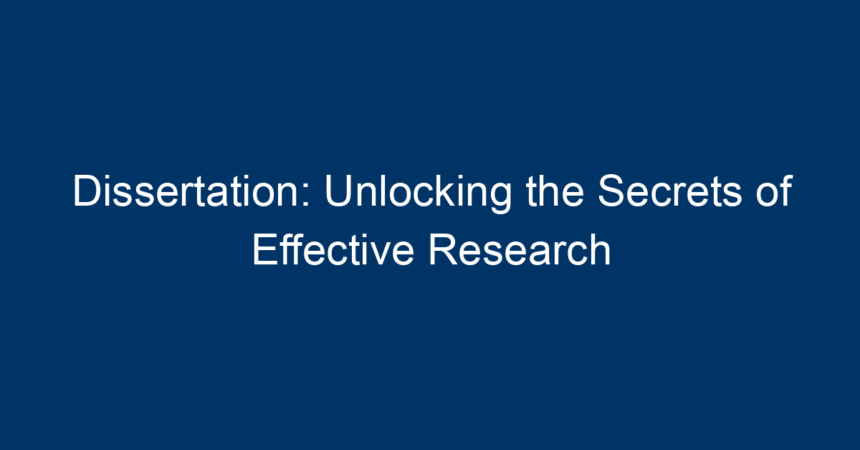Writing a dissertation is often seen as one of the most daunting challenges that graduate students face. It is not just a lengthy document; it’s a culmination of years of study, dedicated research, and an opportunity to present your original contributions to your field. This article delves deep into the secrets of effective research for your dissertation, providing you with actionable insights and strategies to make the process more manageable and rewarding.
Understanding the Dissertation
What is a Dissertation?
A dissertation is a comprehensive piece of academic writing that presents the author’s research and findings. Typically required for postgraduate degrees, it serves as a demonstration of the author’s expertise, analytical skills, and ability to contribute to academic discourse.
Importance of a Well-Structured Dissertation
A well-structured dissertation not only showcases your research capabilities but also reflects your aptitude for organized thought. A clear structure helps guide your readers through your argument, making it easier for them to understand and engage with your work.
Planning Your Research
Setting Clear Objectives
Before diving into research, establish clear objectives for your dissertation. What are the questions you aim to answer? What hypotheses will you test?
- SMART Goals: Utilize the SMART criteria—Specific, Measurable, Achievable, Relevant, Time-bound—to develop your research objectives. This strategy ensures that you stay focused and organized throughout the research process.
Conducting a Literature Review
A literature review is an essential step in dissertation research. It involves reviewing existing literature related to your topic to identify gaps in current knowledge and situate your research within the existing body of work.
- Tips for an Effective Literature Review:
- Use academic databases like JSTOR, Google Scholar, and your university’s library resources.
- Organize your findings thematically or chronologically.
- Take meticulous notes and highlight significant theories or methodologies.
Methodological Considerations
Choosing the Right Methodology
Your research methodology forms the backbone of your dissertation. Depending on your field and research questions, you may choose qualitative, quantitative, or mixed methods.
-
Qualitative Methods: These involve non-numerical data and can include interviews, focus groups, and content analysis. They are particularly effective for exploratory research or understanding complex social phenomena.
-
Quantitative Methods: Involves numerical data and statistical analysis. Surveys and experimental designs fall into this category and are suitable for hypothesis testing.
- Mixed Methods: Combines both qualitative and quantitative approaches to provide a more comprehensive understanding of the research problem.
Data Collection Techniques
Once you’ve chosen your methodology, you need to select the appropriate data collection techniques.
- Surveys and Questionnaires: Useful for gathering data from larger populations.
- Interviews: Provide depth but can be time-consuming.
- Case Studies: Offer insight into specific instances but may lack generalizability.
Writing and Structuring Your Dissertation
Crafting a Compelling Introduction
Your dissertation introduction should set the stage for your research. It should convey the importance of your topic, provide context, and outline your research questions and objectives.
- Key Components of an Introduction:
- Background information on your topic
- Definition of key terms
- A brief overview of your research methodology
- Significance of your study
Developing a Strong Literature Review Section
Your literature review should summarize the existing research, highlighting key findings and identifying gaps that your dissertation aims to fill.
- Structure: Begin with broader theories before narrowing down to specific studies. Ensure a logical flow that leads readers through your argument.
Results and Discussion Sections
In the results section, present your findings clearly, using tables and figures where appropriate. Your discussion should interpret these results, linking back to your research questions and objectives.
- Key Considerations:
- Relate your findings to existing literature.
- Discuss limitations and potential biases in your study.
- Suggest areas for future research.
Conclusion
Conclude by summarizing your research contributions and emphasizing its importance. This is also a space to reflect on the research journey, the challenges faced, and how they were overcome.
Revising and Refining Your Dissertation
Importance of Editing and Proofreading
Once your dissertation is drafted, the revision process begins. It’s essential to proofread for grammatical errors, clarity, and coherence.
- Editing Tips:
- Take a break before revising to view your work with fresh eyes.
- Use online grammar-check tools but don’t rely solely on them.
- Seek feedback from peers or mentors for different perspectives.
Seeking Feedback
Don’t hesitate to consult your supervisor or colleagues for feedback. Constructive criticism is invaluable for improving your work.
Finalizing Your Dissertation
Preparing for Submission
Ensure that you follow your institution’s guidelines regarding formatting and submission methods. Most universities have strict requirements—pay attention to details like citation styles, margins, and font type.
Defending Your Dissertation
Once submitted, you may need to prepare for a dissertation defense. This involves presenting your research findings to a committee and answering questions.
- Prepare Thoroughly: Practice your presentation multiple times, anticipate possible questions, and be ready to defend your methodology and conclusions.
Conclusion: Actionable Insights for Successful Dissertation Research
Navigating the complex landscape of dissertation writing doesn’t have to be overwhelming. By setting clear objectives, conducting a thorough literature review, selecting appropriate methodologies, and structuring your dissertation effectively, you can unlock the secrets to successful research.
A Quick Recap of Actionable Steps:
- Set SMART Goals: Clarity in objectives guides your entire research.
- Conduct a Comprehensive Literature Review: Identify gaps and frame your study’s uniqueness.
- Choose a Suitable Methodology: Align your methods with your research questions.
- Organize Your Writing: Structure your dissertation for clarity and flow.
- Edit and Seek Feedback: Enhance your final draft through revisions and peer input.
Embarking on your dissertation is a journey filled with opportunities for intellectual growth and discovery. Now that you have the tools and knowledge, it’s time to take the next step in your academic career. Happy researching!




